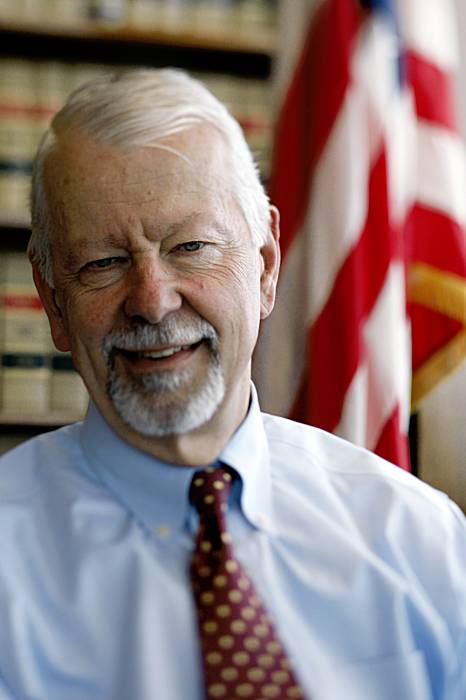 SAN FRANCISCO (AP) -- Rumors swirled that the federal judge who had struck down California's same-sex marriage ban last summer was gay, but the lawyers charged with defending the measure remained silent on the subject. Their preferred strategy for getting the ruling overturned on appeal was to focus on the law, not a judge's personal life, they said.
SAN FRANCISCO (AP) -- Rumors swirled that the federal judge who had struck down California's same-sex marriage ban last summer was gay, but the lawyers charged with defending the measure remained silent on the subject. Their preferred strategy for getting the ruling overturned on appeal was to focus on the law, not a judge's personal life, they said.
Eight months later, Proposition 8's proponents and their attorneys have taken a new position. They filed a motion Monday seeking to vacate Chief U.S. District Judge Vaughn Walker's historic ruling, a move they said was prompted by the now-retired jurist's recent disclosure that he is in a long-term relationship with another man.
Lawyers for the ban's backers argue that the judge's relationship status, not his sexual orientation, gave him too much in common with the couples who successfully sued to overturn the ban in his court. The judge should have recused himself or at least revealed the relationship to avoid a real or perceived conflict of interest, the lawyers say.
"If at any time while this case was pending before him, Chief Judge Walker and his partner determined that they desired, or might desire, to marry, Chief Judge Walker plainly had an interest that could be substantially affected by the outcome of the proceeding," wrote attorneys for the coalition of religious and conservative groups that put Proposition 8 on the November 2008 ballot.
They are now asking the judge who inherited the case when Walker retired at the end of February to toss out Walker's August decision. The 9th U.S. Circuit Court of Appeals already is reviewing its legal merits at the request of the voter-approved measure's sponsors.
Walker has said that he did not consider his sexual orientation to be any more a reason for recusal than another judge's race or gender normally would be. A spokeswoman said Monday that the judge wouldn't comment on the motion.
American Foundation for Equal Rights President Chad Griffin, whose group has funded the legal effort to strike down Proposition 8, scoffed at the notion that the judge's personal life could imperil his ruling.
Griffin noted that the Obama administration recently had decided to stop defending the federal law that bans recognition of same-sex marriage after determining that it, too, was unconstitutional.
"This motion is another in a string of desperate and absurd motions by the proponents of Proposition 8, who refuse to accept that the freedom to marry is a constitutional right," he said.
Walker, a 67-year-old Republican appointee, declared Proposition 8 to be an unconstitutional violation of gay Californians' civil rights. He also ordered the state to stop enforcing the gay marriage ban, but the 9th Circuit put his order on hold while the case is on appeal.
Speculation about Walker's sexual orientation circulated during the 13-day trial that preceded his decision and after he handed down his ruling. Lawyers for Protect Marriage, the coalition that sponsored Proposition 8, however, had purposely refrained from raising his sexual orientation as a legal issue until Monday.
But they decided it gave them grounds for getting Walker's decision struck down after the judge disclosed his 10-year relationship this month to a group of courthouse reporters, said Protect Marriage general counsel Andy Pugno.
"We deeply regret the necessity of this motion. But if the courts are to require others to follow the law, the courts themselves must do so as well," Pugno added.
Indiana University Law School professor Charles Geyh, an expert on judicial ethics, said that without more evidence that Walker stood to personally benefit if same-sex marriages were legal in California, he found it difficult to imagine that the particulars of the judge's same-sex relationship provided gay marriage opponents with an avenue for reversing his ruling.
"It really implies it would be fine if he were essentially surfing at bars and had a new partner every night because he wouldn't want to be married," he said. "I don't see that as advancing their cause."
Proposition 8's sponsors also have been trying to get the federal appeals court to order Walker to return his personal video copy of the trial. The judge has been using a three-minute segment of one of their witnesses being cross-examined for a lecture he's been giving on cameras in the courtroom.
- Home
- News
- Opinion
- Entertainment
- Classified
- About Us
 MLK Breakfast
MLK Breakfast- Community
- Foundation
- Obituaries
- Donate
11-05-2024 6:00 pm • PDX and SEA Weather












































































































































































































































































































